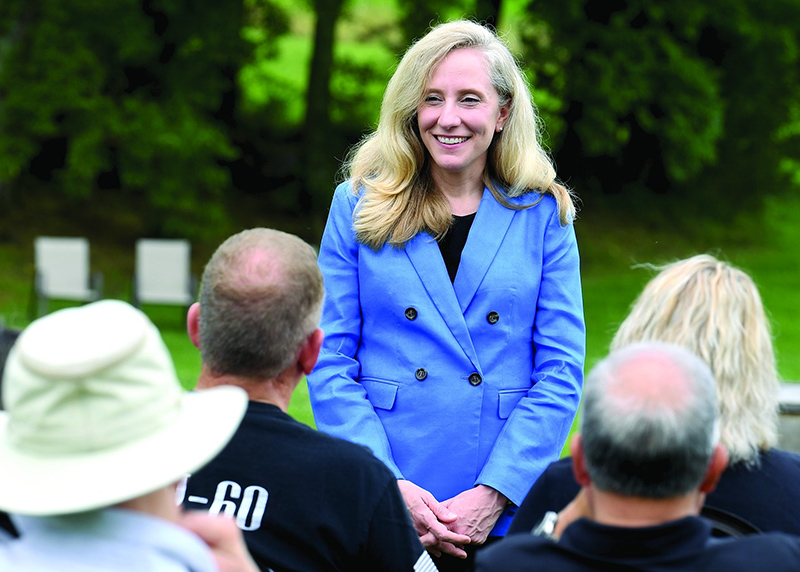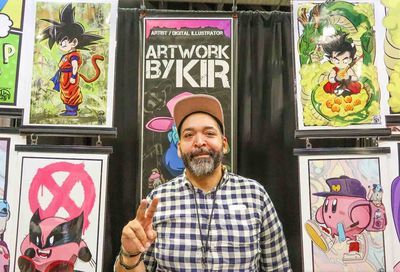Advocates: Masterpiece Cakeshop decision underscores need for explicit LGBTQ legal protections
It's now up to lawmakers and movement leaders to push for clear, comprehensive laws prohibiting anti-LGBTQ discrimination

Equality advocates are arguing for explicit, well-defined legal protections for LGBTQ people after the Supreme Court ruled in favor of a bakery that used religion to justify discriminating against a gay couple.
On Monday morning, the nation’s highest court ruled in favor of Jack Phillips, a Colorado baker who turned away Charlie Craig and David Mullins when they sought him out for a wedding cake, determining he had a right to some type of religious exemption, but failing to define what that exemption would look like.
In its opinion, the court narrowly found that the Colorado Civil Rights Commission may have acted in a prejudicial manner against Phillips when it ruled he violated state civil rights law by refusing to serve the couple. As such, they felt the baker had not received a fair hearing, and reversed the commission’s finding.
But many LGBTQ advocates note that the court’s findings were specific to the Masterpiece case, and that other cases dealing with similar issues may result in a different outcome.
The LGBTQ political group Log Cabin Republicans noted that the Court had essentially chosen to “hit the pause button” when it came to navigating a balance between religious freedom and LGBTQ equality.
“There will be many on the left who will say that this ruling opens the door to rampant discrimination, and many on the right who will declare that this is a major milestone for advocates of religious liberty — but neither will be correct,” Log Cabin President Gregory T. Angelo said in a statement.
“The fact that Justices appointed by Presidents Clinton and Obama sided with Masterpiece Cakeshop should be an indication that there is more nuance to this decision than meets the eye,” Angelo said, referring to a concurring opinion from liberal justices Elena Kagan and Stephen Breyer that found that the commission had demonstrated bias against Phillips. “In writing for the majority of the Court, Justice Anthony Kennedy declared the ‘outcome of cases like this in other circumstances must await further elaboration in the courts’; we look forward to that day.”
But Angelo said the decision primarily points to the “glaring absence of federal LGBT non-discrimination legislation.” The organization has previously spoken of the importance of a Utah-like compromise, in which religious organizations and people with sincere beliefs aren’t forced to violate their faith, but that ensures LGBTQ people are protected from various forms of discrimination, including in public accommodations. The Church of Jesus Christ of Latter-Day Saints was instrumental in supporting the legislation in heavily Mormon Utah, and pushing for its eventual passage.
Others drew similar conclusions but pointed to an already existing piece of legislation, the Equality Act, which would enshrine permanent protections for LGBTQ people in Title VII of the Civil Rights Act.
U.S. Sen. Tammy Baldwin (D-Wis.), the nation’s only LGBTQ senator, released a statement via Twitter endorsing the Equality Act as the solution the country needs to resolve the First Amendment issues left in limbo by the court’s decision.
“While I wish the court had provided clarity to LGBTQ people simply seeking to access goods and services in an open marketplace, I’m pleased that the justices explicitly acknowledged the right of LGBTQ Americans to live free from discrimination,” Baldwin said in her statement. “However, this ruling may be used by some to further discrimination, and underscores the need for Congress to pass the Equality Act, clear and comprehensive federal legislation to ban discrimination against LGBTQ people and protect the freedom of full equality for every American.”
We must continue working to protect the freedom of full equality for every American. #OpenforAll pic.twitter.com/xme4VMctHZ
Read Next— Sen. Tammy Baldwin (@SenatorBaldwin) June 4, 2018
U.S. Rep. Joseph Kennedy III (D-Mass.), the chairman of the Congressional Transgender Equality Task Force and the co-sponsor of the Do No Harm Act — which would prevent the federal Religious Freedom Restoration Act being used to justify discrimination — echoed Baldwin’s sentiments but expressed concern over the leeway the decision might give to those wishing to discriminate against LGBTQ people.
“Allowing exemptions to our civil rights ignores the painful lessons of our nation’s past. Today’s Supreme Court ruling sends a dangerous signal to those across the country who wish to use religious freedom as a sword rather than a shield,” Kennedy said in his statement. “Most critically, today’s decision underscores the urgent need for nationwide non-discrimination protections to ensure no one who calls America home is denied services, opportunity or basic dignity simply because of who they are.”
U.S. Rep. Jared Polis (D-Colo.), who is running for governor of Colorado, said in a statement that the decision was disappointing, but allows lawmakers the opportunity to clearly define what rights LGBTQ people should enjoy.
“We can and must provide LGBTQ people with abundantly clear protections from discrimination in law,” he said.
Other advocates warned that social conservatives would not stop their ongoing assault against LGBTQ rights, and would use Monday’s decision to justify further efforts to chip away at various forms of legal recognition for LGBTQ people.
“It’s clear that the Religious Right was hoping for a decision that would transform religious liberty from a shield to protect our individual rights into a sword that would allow them to attack the rights of LGBTQ people. That’s not what they got. This is a narrow decision focused on the particular facts of the particular case,” Michael Keegan, the president of People for the American Way, said in a statement.
“But while the Court refused the invitation to create a new right to discriminate, it also failed to take a clear stand against the discrimination that millions of people still face, including the gay couple in this case,” Keegan added. “The simple truth is that everyone should be able to live their lives without being afraid that they’ll be refused service because of who they are or who they love. It’s time for our nation’s laws and courts to catch up to the public in recognizing that basic principle.”
Sarah Kate Ellis, the president and CEO of GLAAD, also predicted future attacks on LGBTQ equality, saying: “Today’s decision emboldens the anti-LGBTQ Alliance Defending Freedom and the Trump Administration in their persistent push to legalize discrimination against LGBTQ people under the misnomer of religious freedom. LGBTQ people will continuously be vulnerable until the liberty and justice for all tenants of the Constitution apply to all Americans, including LGBTQ people.”
Former Houston Mayor Annise Parker, the president and CEO of the LGBTQ Victory Institute, noted that the fight to define what constitutes a reasonable exemption will now be fought in the courts — both state and federal — and at the legislative level, where lawmakers can pass their own bills defining religious exemptions or are often involved in confirming judges to state and local circuit courts.
“Today is a sad day for America and especially for LGBTQ youth who have grown up believing in the inevitable move toward fairness and justice for our community,” Parker said in a statement. “Homophobic forces will purposefully over-interpret the ruling and challenge existing non-discrimination laws by refusing service to LGBTQ people in even more situations — denying them dinner at a restaurant, lodging at a hotel, or renting an apartment.
“State and local civil rights enforcement offices are now on the frontlines in protecting LGBTQ people from widespread discrimination, so it is critical we pressure elected leaders to fully fund these agencies and ensure they have the resources to push back on attempts at discrimination,” Parker said. “…[W]e need all elected officials who support equality to prioritize these offices given today’s ruling. Our representatives must respond.”
Amit Paley, the CEO and executive director of the Trevor Project, a suicide prevention organization which helps at-risk LGBTQ teens, reiterated that discrimination against LGBTQ people, and LGBTQ youth in particular, is both “wrong and un-American.”
“LGBTQ adults and youth should be able to live their lives freely and proudly, without discrimination. When business open their doors to the public, they should be open to all, regardless of their sexual orientation or gender identity,” Paley said in a statement.
“It is wrong to allow pediatricians to turn away child patients, just because they are transgender. It is wrong to allow schools to expel students, just because they are gay or lesbian. It is wrong to allow stores to turn away teen-age customers because they are bisexual or queer,” Paley added, noting that discrimination and rejection can lead to higher rates of suicidal ideation.
“We also want to make clear that you can be LGBTQ and a person of faith. We call on faith communities across the country to remind LGBTQ youth that they are not alone, and they should feel welcome and affirmed to join them in practicing their faith.”
Support Metro Weekly’s Journalism
These are challenging times for news organizations. And yet it’s crucial we stay active and provide vital resources and information to both our local readers and the world. So won’t you please take a moment and consider supporting Metro Weekly with a membership? For as little as $5 a month, you can help ensure Metro Weekly magazine and MetroWeekly.com remain free, viable resources as we provide the best, most diverse, culturally-resonant LGBTQ coverage in both the D.C. region and around the world. Memberships come with exclusive perks and discounts, your own personal digital delivery of each week’s magazine (and an archive), access to our Member's Lounge when it launches this fall, and exclusive members-only items like Metro Weekly Membership Mugs and Tote Bags! Check out all our membership levels here and please join us today!

























You must be logged in to post a comment.